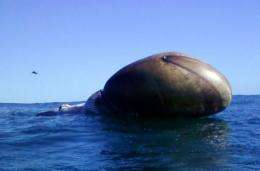The carcass of a 14-meter whale that washed ashore in the South African tourist town of Knysna is seen floating. South African coastal authorities have warned beachgoers that sharks were moving into the area, feeding on the remains of the whale.
South African coastal authorities on Friday warned beachgoers around the tourist town of Knysna that sharks were moving into the area, feeding on the remains of a whale that ran ashore two days ago.
After sea crews failed to dislodge the 14-metre (46-foot) whale from the rocks off the southern coast, workers from nearby towns began chopping up the carcass and hauling parts away by road, the National Sea Rescue Institute said.
"It is normal behaviour for sharks to forage on whale carcasses, when there are such, at sea and therefore common for sharks to be attracted to the overspill of waste from the carcass into the sea during the efforts to remove the carcass," said spokesman Craig Lambinon.
"Fishermen and boaters are informing NSRI of an apparent increase in shark activity around the site," he added.
"Increased shark activity can be expected along the Southern Cape coastline as a result, and the public are urged to be aware of this and to be cautious," he said.
Lambinon said it was not yet clear how long it would take to finish removing the carcass.
Originally identified as a southern right whale, Lambinon said that upon closer inspection the whale was determined to be a Bryde's whale, a type of baleen whale found in subtropical waters.
(c) 2012 AFP






















